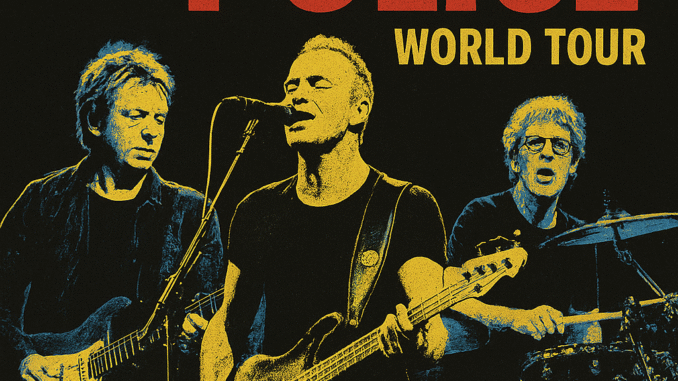
NEW ERA: Reunited and It Feels So Good – The Police Embark on Phenomenally Successful 2007-2008 World Tour, Bringing Iconic Hits to Sold-Out Crowds Globally and Reigniting the Magic of One of Rock’s Most Influential Bands
When The Police announced their reunion in early 2007 after more than two decades apart, the music world collectively gasped. Few bands have carried such a lasting influence on both rock and pop as this iconic trio—Sting, Andy Summers, and Stewart Copeland—whose mix of reggae-infused rhythms, jazz flourishes, and razor-sharp rock songwriting left a permanent mark on the late 1970s and early 1980s. But after their turbulent breakup in 1986, few expected them to ever share a stage again. Yet in 2007, against all odds, the band set aside their differences and launched a global reunion tour that would go on to become one of the highest-grossing tours of its time, rekindling the spark for longtime fans and introducing their timeless catalog to a new generation.
A Reunion That Shocked the World
The official announcement came at the 2007 Grammy Awards, where The Police opened the ceremony with a blistering performance of “Roxanne.” It was a surreal moment—three legends standing together once more, reminding everyone why their music had never left the airwaves. Immediately, anticipation skyrocketed. Tickets for the reunion tour went on sale shortly after, and within minutes, stadiums across North America and Europe sold out. What began as a 30-date run quickly expanded into a worldwide juggernaut spanning over 150 shows across five continents.
The Tour That Became a Global Phenomenon
The Police World Tour 2007-2008 was nothing short of historic. Playing to more than 3.7 million fans and grossing over $360 million, it became the third highest-grossing tour ever at the time. Cities from Vancouver to Buenos Aires to Tokyo were electrified by the band’s return. Fans who thought they’d never again hear “Message in a Bottle” or “Every Breath You Take” performed live by the original members were treated to unforgettable nights of nostalgia mixed with raw, powerful musicianship.
Sting’s vocals carried the same unmistakable edge, Andy Summers’ guitar tones remained as textured and hypnotic as ever, and Stewart Copeland’s ferocious drumming proved that time had done little to dull his explosive energy. Unlike many nostalgia tours, this reunion wasn’t about going through the motions—it was about reclaiming the chemistry that made The Police unstoppable.
Tensions Resurfaced, But the Music Endured
Of course, no Police story is complete without tension. The trio’s history is filled with legendary creative clashes, and those dynamics inevitably resurfaced on tour. Sting and Copeland, in particular, admitted to disagreements over arrangements and the setlist. But rather than derail the experience, the friction fueled the performances, adding a palpable edge that fans could feel. It was messy, raw, and real—the very essence of rock and roll.
A Legacy Reinforced for Generations
By the time the tour wrapped in New York’s Madison Square Garden in August 2008, The Police had done more than reunite—they had re-cemented their legacy. They proved that their music was not only timeless but still powerful enough to command stadiums decades later. Songs like “Don’t Stand So Close to Me,” “So Lonely,” and “Walking on the Moon” resonated as strongly in the 2000s as they had in the ’80s.
Critics praised the reunion as more than a cash grab—it was a genuine celebration of artistry, a victory lap for a band whose influence can still be traced in countless modern acts across rock, punk, and alternative music.
The End of an Era
The Police made it clear the tour would be their last. Sting went back to his solo projects, Summers continued exploring photography and music, and Copeland returned to composing and experimental collaborations. Yet for those two years, the world witnessed a dream realized: three musical icons revisiting their past, not to rewrite it, but to give it one final, unforgettable chapter.
The 2007-2008 reunion wasn’t just about nostalgia. It was a cultural event, a reminder that great music truly transcends time—and that sometimes, even the most fractured bands can find harmony again, if only for a fleeting, glorious moment.
Leave a Reply